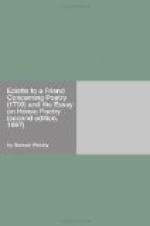And these, if I mistake not, were the main Reasons on which the foremention’d Rules were grounded. Let’s now enquire into the Strength and Validity of them: To begin with Homer, he wrote in that manner, because most of the ancient Eastern Learning, the Original of all others, was Mythology. But this being now antiquated, I cannot think we are oblig’d superstitiously to follow his Example, any more than to make Horses speak, as he does that of Achilles, 2. If a Poet lights on any single Hero, whose true Actions and History are as important as any that Fable ever did or can produce, I see no reason why he may not as well make use of him and his Example to form the Manners and enforce any Moral Truth, as seek for one in Fable for that purpose: Nay, he can scarce fail of persuading more strongly, because he has Truth it self; the other but the Image of Truth, especially if his History be, in the Third place, of it self diverting and admirable. If it has from its own Fund, and already made to his hand those Deorum Ministeria, which cost the Poet so much in the forming ’em out of his own Brain. Nor can we suppose Fiction it self pleases; no, ’tis the agreeable and the admirable, in the Dress of Truth; and such a Plan as this would effectually answer both the Ends of Poetry in general, delectari & monere, nay come up fuller to the End of Epic, which is agreeable Instruction; and thence it follows strongly, that a Poem written in such a manner, must, notwithstanding the foregoing Rules, be a true and proper Heroic Poem, especially if adorn’d with Poetical Colours and Circumstances through the whole Body thereof.
Now that all this is not gratis dictum, I think I can prove, even from most of those very Authors I’ve already produc’d, as of the contrary Opinion; and that I can make it appear, Bossu goes too far in fixing Fable as the Essential Fund and Soul of the principal Action in an Epic Poem. To begin with Rapin, who has this Passage, sur la Poetique, Reflex. 5. La Poesie Heroique, &c. “Heroique Poesie, according to Aristotle, is a Picture or Imitation of an Heroic Action; and the Qualities of the Action are, That it ought to be (among others) true, or at least, such as might pass for true;” Thus he. And hence it follows, according to him and Aristotle, that the principal Action in Heroic, not only ought to pass for Truth, but may be really true: For Horace, he does indeed call the Iliads a Fable; but then he does not oblige his Poet superstitiously to follow Homer in every thing, owning that he sometimes doats as well as other Men: Further, this may, and I think does, refer rather to the Dress and Turn of the Action, than to the Bottom and Ground of his History, which there’s at least as much, if not more reason to believe true than false: And in the same Sense may we take Petronius and Boileau; nay, if we don’t take ’em thus, I can’t tell whether there were ever such a thing as a true Heroic Poem in the World; not so much as the Fairy-Queen,




